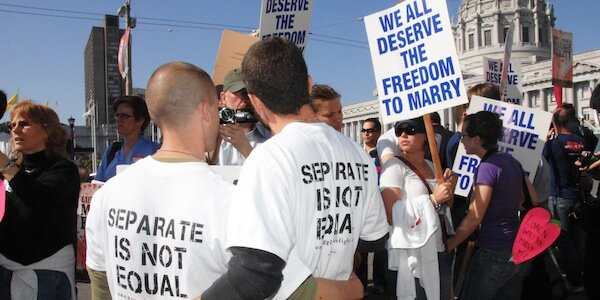
Welcome but unexpected! President Obama has decided that the Defense of Marriage Act, which prevents recognition of same-sex marriage at a federal level, is unconstitutional, and has asked the Department of Justice to stop defending the law. This doesn't mean the law won't be enforced — that would take an act of Congress or a court ruling — but it is a promising sign that Obama's administration is taking LGBT rights seriously. Here are some excerpts of the memo sent from the DOJ to Speaker John Boehner:
Dear Mr. Speaker:
After careful consideration, including review of a recommendation from me, the President of the United States has made the determination that Section 3 of the Defense of Marriage Act ("DOMA"), 1 U.S.C. § 7, as applied to same-sex couples who are legally married under state law, violates the equal protection component of the Fifth Amendment. Pursuant to 28 U.S.C. § 530D, I am writing to advise you of the Executive Branch's determination and to inform you of the steps the Department will take in two pending DOMA cases to implement that determination.
[…]
Standard of Review
The Supreme Court has yet to rule on the appropriate level of scrutiny for classifications based on sexual orientation. It has, however, rendered a number of decisions that set forth the criteria that should inform this and any other judgment as to whether heightened scrutiny applies: (1) whether the group in question has suffered a history of discrimination; (2) whether individuals "exhibit obvious, immutable, or distinguishing characteristics that define them as a discrete group"; (3) whether the group is a minority or is politically powerless; and (4) whether the characteristics distinguishing the group have little relation to legitimate policy objectives or to an individual's "ability to perform or contribute to society." See Bowen v. Gilliard, 483 U.S. 587, 602-03 (1987); City of Cleburne v. Cleburne Living Ctr., 473 U.S. 432, 441-42 (1985).
Each of these factors counsels in favor of being suspicious of classifications based on sexual orientation. First and most importantly, there is, regrettably, a significant history of purposeful discrimination against gay and lesbian people, by governmental as well as private entities, based on prejudice and stereotypes that continue to have ramifications today. Indeed, until very recently, states have "demean[ed] the[] existence" of gays and lesbians "by making their private sexual conduct a crime." Lawrence v. Texas, 539 U.S. 558, 578 (2003).
Second, while sexual orientation carries no visible badge, a growing scientific consensus accepts that sexual orientation is a characteristic that is immutable, see Richard A. Posner, Sex and Reason 101 (1992); it is undoubtedly unfair to require sexual orientation to be hidden from view to avoid discrimination, see Don't Ask, Don't Tell Repeal Act of 2010, Pub. L. No. 111-321, 124 Stat. 3515 (2010).
Third, the adoption of laws like those at issue in Romer v. Evans, 517 U.S. 620 (1996), and Lawrence, the longstanding ban on gays and lesbians in the military, and the absence of federal protection for employment discrimination on the basis of sexual orientation show the group to have limited political power and "ability to attract the [favorable] attention of the lawmakers." Cleburne, 473 U.S. at 445. And while the enactment of the Matthew Shepard Act and pending repeal of Don't Ask, Don't Tell indicate that the political process is not closed entirely to gay and lesbian people, that is not the standard by which the Court has judged "political powerlessness." Indeed, when the Court ruled that gender-based classifications were subject to heightened scrutiny, women already had won major political victories such as the Nineteenth Amendment (right to vote) and protection under Title VII (employment discrimination).
Finally, there is a growing acknowledgment that sexual orientation "bears no relation to ability to perform or contribute to society." Frontiero v. Richardson, 411 U.S. 677, 686 (1973) (plurality). Recent evolutions in legislation (including the pending repeal of Don't Ask, Don't Tell), in community practices and attitudes, in case law (including the Supreme Court's holdings in Lawrence and Romer), and in social science regarding sexual orientation all make clear that sexual orientation is not a characteristic that generally bears on legitimate policy objectives. See, e.g., Statement by the President on the Don't Ask, Don't Tell Repeal Act of 2010 ("It is time to recognize that sacrifice, valor and integrity are no more defined by sexual orientation than they are by race or gender, religion or creed.")
To be sure, there is substantial circuit court authority applying rational basis review to sexual-orientation classifications. We have carefully examined each of those decisions. Many of them reason only that if consensual same-sex sodomy may be criminalized under Bowers v. Hardwick, then it follows that no heightened review is appropriate – a line of reasoning that does not survive the overruling of Bowers in Lawrence v. Texas, 538 U.S. 558 (2003). Others rely on claims regarding "procreational responsibility" that the Department has disavowed already in litigation as unreasonable, or claims regarding the immutability of sexual orientation that we do not believe can be reconciled with more recent social science understandings. And none engages in an examination of all the factors that the Supreme Court has identified as relevant to a decision about the appropriate level of scrutiny. Finally, many of the more recent decisions have relied on the fact that the Supreme Court has not recognized that gays and lesbians constitute a suspect class or the fact that the Court has applied rational basis review in its most recent decisions addressing classifications based on sexual orientation, Lawrence and Romer. But neither of those decisions reached, let alone resolved, the level of scrutiny issue because in both the Court concluded that the laws could not even survive the more deferential rational basis standard.
[…]
Sincerely yours,
Eric H. Holder, Jr.
Attorney General
Exciting! If anyone out there is a legal expert and can speak more fully to the implications of this decision, please let us know in the comments. But still: awesome.




